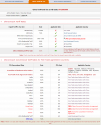RECEP signed in Hanoi at 11:45AM local time, GMT 4:45.
Signing is only the first step. Let's wait for ratification by all parties before celebrating.
RECEP signed in Hanoi at 11:45AM local time, GMT 4:45.

But look at the result. All these small farmers are screwed anyways because of poor practices. They're also worsening the antibiotic resistance issue.
I visited the big companies such as Wen Group and Mu Yuan and they're are all earning 2-3x usual profits. Their pigs are locked down as well as Chinese during COVID.
Bird flu still affects a lot of farms and the animal CDC has to go in and raze everything every time it happens. Millions of birds dead at a time and the farmers are compensated poorly by the government.
What if this happens to wheat or rice?
The government has been forcing small pig farms to become contract farming for big pig farms so that big pig farms can provide the technology know how and infrastructure for small pig farmers. In addition, this method also resolves the issue of many township doesn't want big pig farms nearby but would be more receptive for small pig farms. Of course there are also some downside of this arrangement but you can't have one size fits all strategy for agriculture industry. Government needs to take into consideration of many factors regarding agriculture from food security, employment, environmental impact, inflation, affordability etc.
That's why I disagree that China should implement policies to support big and high tech farming. In addition, every countries support their agriculture industry through handouts and prices support. China shouldn't put its farming industry at disadvantages by not supporting them.
Furthermore, China does have big and high tech farms in certain area such as cotton in Xinjiang, Wheat, rice, and corn in Northeast, potatoes in inner Mongolia. Due to geography, high tech farming isn't suitable for many other places.
I would also argue that result in reliance of the same variety seeds and breeding stocks such as China relied upon European for its high quality breeding stock. One of the reasons why China was vulnerable in expanding its pig herds is due to the need to import breeding herds from other countries. Same thing with birds, China needs to import breeding stocks from the US.
Remember how corporate farming banana got wiped in 1950s due to fungus and now it again facing the same existential crisis. The reason is there is only one variety of banana so when there is a problem the whole industry got affected. So corporate farming isn't as rosy as you might think.
The government has been forcing small pig farms to become contract farming for big pig farms so that big pig farms can provide the technology know how and infrastructure for small pig farmers. In addition, this method also resolves the issue of many township doesn't want big pig farms nearby but would be more receptive for small pig farms. Of course there are also some downside of this arrangement but you can't have one size fits all strategy for agriculture industry. Government needs to take into consideration of many factors regarding agriculture from food security, employment, environmental impact, inflation, affordability etc.
That's why I disagree that China should implement policies to support big and high tech farming. In addition, every countries support their agriculture industry through handouts and prices support. China shouldn't put its farming industry at disadvantages by not supporting them.
Furthermore, China does have big and high tech farms in certain area such as cotton in Xinjiang, Wheat, rice, and corn in Northeast, potatoes in inner Mongolia. Due to geography, high tech farming isn't suitable for many other places.
I would also argue that result in reliance of the same variety seeds and breeding stocks such as China relied upon European for its high quality breeding stock. One of the reasons why China was vulnerable in expanding its pig herds is due to the need to import breeding herds from other countries. Same thing with birds, China needs to import breeding stocks from the US.
Remember how corporate farming banana got wiped in 1950s due to fungus and now it again facing the same existential crisis. The reason is there is only one variety of banana so when there is a problem the whole industry got affected. So corporate farming isn't as rosy as you might think.
Yes, so called "high tech" agriculture is a highly fragile system. It will not survive a major biological crises.
Hi KYli,
Regarding RCEP, So Japan can export Nikon and Canon DUVL and other Semi conductor equipment without fear of US sanction?

But a counterargument could be looking at how the COVID crisis is being managed. China's top down approach (scientifically driven) seems to be beating the decentralized approach.
Ideally, you would want to focus on problem prevention instead of mitigation. Food security is of paramount concerns to CCP which is not surprising given Chinese history. For stability, the existing agriculture system should contain as many pathways as possible to cushion against any unexpected crises.
There are also political considerations. High tech agriculture would inevitably consolidate into a few big players. Besides run of the mill lobbying, would they use their control to bargain for political power when the central authority is weak?
That's where foreign competition/low import tariffs comes in.
The situation right now is horrible. Not only small farms are dying. China has high tariffs and trade restrictions on agriculture due to lobbying.
But if CCP can't even stop lobbying, who can?
